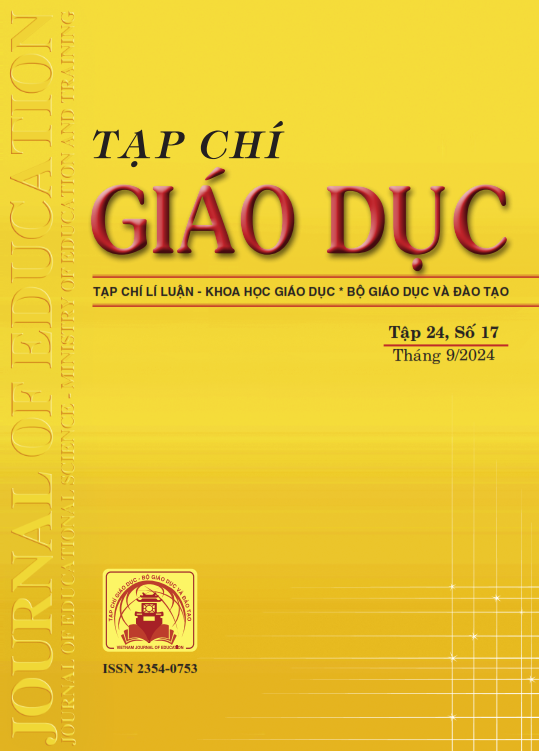Mô hình giáo dục học sinh tài năng, năng khiếu trên thế giới và khuyến nghị đối với Việt Nam
Tóm tắt
To address the national human resource development needs, especially in Vietnam in the context of the fourth industrial revolution, the education system, especially at all levels, not only faces the transformation in the demand for high-quality human resources, but also are required to sufficiently accommodate the need for the varied factors related to special talents and aptitudes. This requires flexibility and creativity in designing educational models, from identifying students with exceptional abilities to creating an appropriate learning environment for them to develop comprehensively. The article uses an overview method to learn about the education model for talented and gifted students in the world, thereby drawing some recommendations for the education model for talented and gifted students in Vietnam, which has traditionally been narrowed mainly to the concept of “Specialized” schools. The article contributes to the discussion on building a theoretical framework on the educational model of talented and gifted students in Vietnam that is compatible with the world context.
Tài liệu tham khảo
Adler, N. J. (1984). Women in International Management: Where are They? View all Authors and Affiliations, 26(4), 78-89. https://doi.org/10.2307/411650
Betts, G. T. (1986). The autonomous learner model for the gifted and talented. In Renzulli J. S. (Ed.), Systems and models for developing programs for the gifted and talented (pp. 27-56). Mansfield Center, CT: Creative Learning Press.
Bhatt, R. (2011). A Review of Gifted and Talented Education in the United States. Education Finance and Policy, 6(4), 557-582. https://doi.org/10.1162/Edfp_a_00048
Bùi Diệu Quỳnh, Hoàng Phương Hạnh, Bùi Thị Thao, Đỗ Quyên (2021). Đào tạo trong trường trung học phổ thông chuyên từ góc nhìn của học sinh chuyên. Tạp chí Khoa học giáo dục Việt Nam, 39, 12-17.
Dai, D. Y., & Kuo, C. C. (2016). State of gifted education in Asia: The need for a critical assessment. In D. Y. Dai & C. C. Kuo (Eds.), Gifted education in Asia: Problems and prospects (pp. vii-xvii). Information Age Publishing. Guilford, J. P. (1967). The Nature of Human Intelligence. McGraw-Hill.
Hoàng Phê (chủ biên, 2003). Từ điển tiếng Việt. Viện Ngôn ngữ học - NXB Đà Nẵng. Kaplan, R. S., & Norton, D. P. (2005). The balanced scorecard: measures that drive performance. Harvard Business Review, 83(7), 172. Lê Anh Vinh, Bùi Diệu Quỳnh, Bùi Thị Diển, Hoàng Phương Hạnh, Phùng Thu Trang (2021). Khảo sát về trình độ đào tạo và thực tế triển khai một số hoạt động giảng dạy của giáo viên các trường trung học phổ thông chuyên. Tạp chí Giáo dục, 507, 1-6.
NAGC (National Association for Gifted Children) (2022). NAGC Pre-K-Grade-12 Gifted Education Programming Standars: A Guide to Planning & Implementin. Routledge.
Renzulli, J. S., & Reis, S. M. (1985). The Schoolwide Enrichment Model: A comprehensive plan for educational excellence. Mansield Center, CT: Creative Learning Press. Tomlinson, C. A. (1999). The Differentiated Classroom: Responding to the Needs of All Learners. Alexandria. VA: Association for Supervision and Curriculum Development. Richard Papale Publisher.
Treffinger, D. J. (1975). Teaching for self-directed learning: A priority for the gifted and talented. Gifted Child Quarterly, 19(1), 46-59.
Treffinger, D. J. (1993). Fostering effective independent learning through individualized programming. In In J. S. Renzulli (Ed.), Systems and models for developing programs for the gifted and talented (pp. 429-460). Australia: Hawker Brownlow.
VanTassel-Baska, J. (1986). Efective curriculum and instruction models for talented students. Gifted Child Quarterly, 30, 164-169.
VanTassel-Baska, J. (2018). American Policy in Gifted Education. Gifted Child Today, 41(2), 98-103. https://doi.org/10.1177/1076217517753020
Vygotsky, L. S. (1978). Mind in society: The development of higher psychological processes. Massachusetts: Harvard University Press.
Tải xuống
Đã Xuất bản
Cách trích dẫn
Số
Chuyên mục
Giấy phép

Tác phẩm này được cấp phép theo Ghi nhận tác giả của Creative Commons Giấy phép quốc tế 4.0 .












